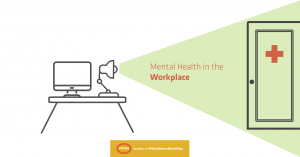- Home
- Blogs
- Employment Talk
Mental Health in the Workplace - It's okay not to be okay
Author
Browse this blog post
Do you know what post-natal depression, obsessive compulsive disorder, anxiety, stress and ADHD have in common? They are every-day mental health issues experienced by employees. And yet the whole area of workplace mental health is burdened with stigma. Why?
Perhaps it's because disorders of the mind are less tangible, almost invisible. Maybe it's because of the many myths and misconceptions around mental health. Or is it because HR professionals, managers and work colleagues do not have the confidence or knowhow to address the issue in the same way they would if it were a broken leg. Or is it because it is too scary, too unpredictable, too complex?
Mental health is all these things, which is why it needs to be tackled head on by employers. Today is World Mental Health Day 2017 and the theme this year is Mental Health in the Workplace.
Despite the good work of many organisations and the bravery of those who are suffering or have suffered from mental health issues speaking out about their experiences, dealing with mental health concerns amongst the workforce remains a very tricky subject. Whether it is the employee who does not accept they have a mental health issue and refuses the employer's assistance, or the employee who doesn't want to share details about their condition with their employer, doing "the right thing" can be fraught with difficulties. Given that 1 in 4 of us will suffer from mental health issues, this cannot be put in the too difficult box. Here are a few Top Tips to think about when dealing with such issues:
- It's good to talk – if you have an employee you are worried about, tell them you have concerns, ask them how they are, and ask what you can do to support them. While a lack of knowledge can be a defence to some disability discrimination claims, knowledge doesn't need to be actual – it can be implied based on what the employer does know and what it observes of the employee's conduct.
- Build trust – if an employee does not want to share details of their health with you, you cannot force them. However, you should explain to them that without a clear understanding of how you can support them in the workplace you may both be missing an opportunity to alleviate any exacerbating factors. Maybe find someone else in the organisation who has suffered mental health issues and who is willing to speak to the employee in confidence to try to encourage them to be more open about the support they need. Make it clear to the employee that you don't need all of the details about their condition, just enough to understand what help you may be able to provide. Also make it clear that information won't be shared any more than is necessary.
- Line mangers play an important role in promoting good health in the workplace and therefore need support and training to foster a healthy working environment where early disclosure of any health issues is encouraged.
- Encourage appropriate language. Words such as "mental", "nutty", lunatic", and "happy pills" are not appropriate anywhere and failing to crack down on such language will leave not only your individual employees but the company itself exposed to risk.
- Stories are very powerful, so encourage openness – having diversity initiatives focussed on mental health issues, inviting speakers who are prepared to talk about their experiences and being open about what the company can do to assist will help create an environment where employees will feel safe to talk about their concerns.
- Get the experts in – many mental health charities are happy to provide support to both employees and employers who are struggling to address mental health issues. Making sure the employee is aware of these organisations (alongside your Occupational Health and Employee Assistance Programmes) but also speaking to them yourself will help you understand what resources may be available to you, and what options may be open to you.
- Keep talking – it's not just about today or about one conversation, getting full transparency and trust will take time on both sides.
Below are some useful links:

